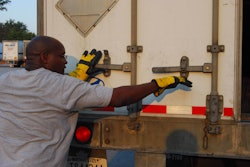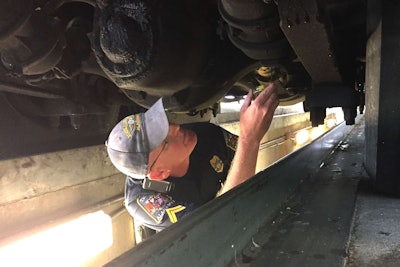 Inspector Chris McNatt checks a chassis at Alabama’s weigh station near the Georgia state line Tuesday, the opening day of International Roadcheck.
Inspector Chris McNatt checks a chassis at Alabama’s weigh station near the Georgia state line Tuesday, the opening day of International Roadcheck.Flatbedders feeling a little ignored should get some relief if they get pulled over during this week’s International Roadcheck, which wraps up Thursday night. The annual three-day event this year focuses on cargo securement. Given that, it’s no surprise that open-deck rigs and their straps get the most attention.
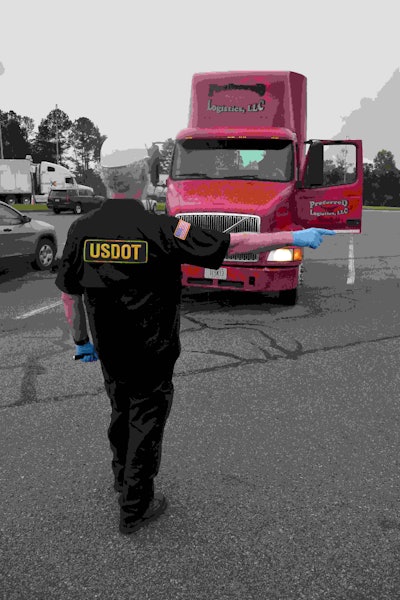 FMCSA agent Tim McCadden, who normally works on carrier compliance, goes through a Level 1 inspection with Rick Henley, driving for Preferred Logistics of Barnesville, Georgia.
FMCSA agent Tim McCadden, who normally works on carrier compliance, goes through a Level 1 inspection with Rick Henley, driving for Preferred Logistics of Barnesville, Georgia.“We check the straps themselves, make sure they’re of the proper quality, not nicked or knotted up,” says Sgt. Tim Smith, the North Alabama regional commander for the Highway Patrol, “and that there’s the proper amount of straps for the cargo they’re hauling.”
He came this week to the state’s only fixed weigh station, on I-59/20 near Heflin, just west of the George state line. Other personnel who work North Alabama also came to support Roadcheck, which was expected to inspect 70,000 trucks in the United States, Canada and Mexico.
If you’re wondering precisely what the regs say about securement, you can check the Federal Motor Carrier Safety Regulations section 393.100. Under the heading of “Subpart I—Protection Against Shifting and Falling Cargo,” it goes into mind-numbing detail, such as the working load limit (0.435 g) for “deceleration in the forward direction” and comprehensive tables showing the load limits for various tie-downs, such as synthetic webbing and nylon rope. Smith says the regs even cover how long a strap’s nick can be before it’s rendered unusable.
Compliance is also more complicated because “there are commodity-specific regulations, depending on what it is, like dressed lumber or crushed cars,” Smith says. Furthermore, FMCSA continually amends the FMCSR, so even someone familiar with the rules might be surprised to learn of a change. For example, it used to be illegal to run a strap outside of a flatbed’s rub rail. Now it’s acceptable, Smith says.
Enclosed vans, too, get checked for securement, says Tim McCadden, a special agent with the Federal Motor Carrier Safety Administration who came from his Alabama Division base in Montgomery to help with Roadcheck. Mainly inspectors look for the obvious – cargo that’s subject to shifting because of inadequate blocking or other securement – but also ensuring any hazmat cargo meets its special securement regs.
The securement emphasis doesn’t exclude other inspections. For selected trucks, most will get a Level 1 inspection. The 37-step exam reviews driver and vehicle fitness.
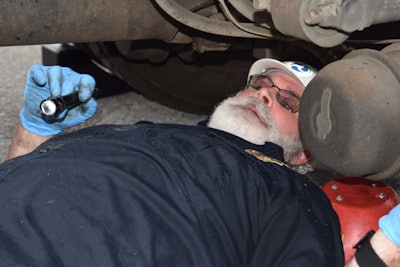 McCadden gets down and dirty scooting around on a roller-board under Henley’s truck.
McCadden gets down and dirty scooting around on a roller-board under Henley’s truck.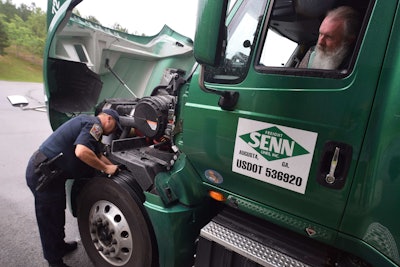 Inspector Steve Chattin checks the truck driven by Al Breland of Senn Freight Lines, which is based in Newberry, South Carolina.
Inspector Steve Chattin checks the truck driven by Al Breland of Senn Freight Lines, which is based in Newberry, South Carolina.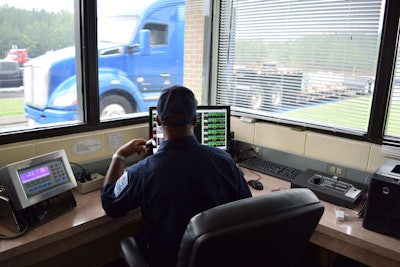 The Commercial Vehicle Safety Alliance, which coordinates Roadcheck, estimates 17 trucks or buses will be inspected every minute in North America during the three-day blitz.
The Commercial Vehicle Safety Alliance, which coordinates Roadcheck, estimates 17 trucks or buses will be inspected every minute in North America during the three-day blitz.


